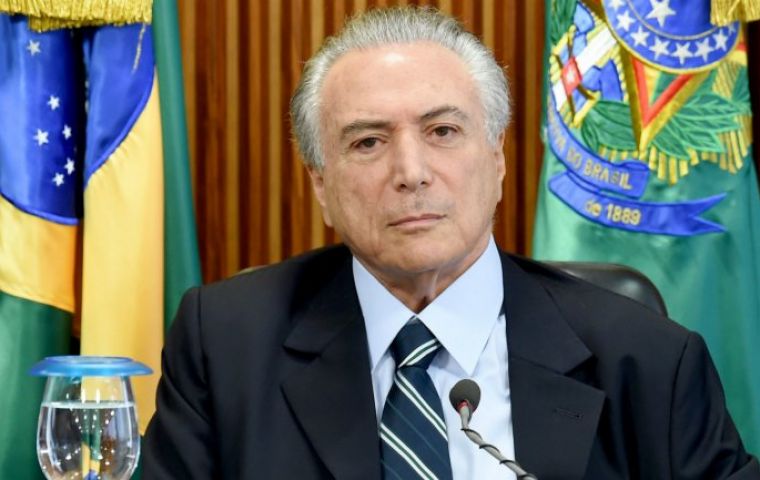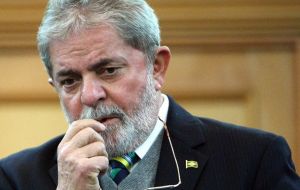MercoPress. South Atlantic News Agency
Temer links Rousseff's removal with the drastic change in economic policy
 Temer candidly admitted that it had become imperious to change the economic course since Brazil has been in the worst recession since the 1930s
Temer candidly admitted that it had become imperious to change the economic course since Brazil has been in the worst recession since the 1930s  Rousseff was repeatedly warned on the course of the economy and refused to implement a pro-business, much needed reforms, balanced budget plan
Rousseff was repeatedly warned on the course of the economy and refused to implement a pro-business, much needed reforms, balanced budget plan  PT-PMDB alliance proved very effective in running Brazil. It rescued Lula da Silva and its minority government in his first presidency when the 'mensolao' scandal
PT-PMDB alliance proved very effective in running Brazil. It rescued Lula da Silva and its minority government in his first presidency when the 'mensolao' scandal Brazilian president Michel Temer addressing business leaders and foreign policy experts in New York earlier this week revealed another twist to the recent political events in the country which led to the impeachment and removal of his elected predecessor Dilma Rousseff.
Temer candidly admitted that it had become imperious to change the economic course in Brazil since the country had been in recession since early 2014 and was suffering the worst performance and contraction in the country's economy since the 1930s, with no prospects of improvement if those policies were continued.
Apparently Rousseff was repeatedly warned on the course of the economy and refused to implement a pro-business, much needed reforms, balanced budget plan, even when this meant cuts in social expenditure and privatization, which was quite distant from the agenda that helped the Workers Party win the presidency four times running.
The comments were delivered on Wednesday to an audience at the New York headquarters of the Americas Society/Council of the Americas (AS/COA).
“And many months ago, while I was still vice president, we released a document named ‘A Bridge to the Future’ because we knew it would be impossible for the government to continue on that course. We suggested that the government should adopt the theses presented in that document called ‘A Bridge to the Future.’ But, as that did not work out, the plan wasn’t adopted and a process was established which culminated with me being installed as president of the republic.”
When impeachment proceedings began, Temer was serving as Rousseff's vice-president and his party, the Brazilian Democratic Movement Party (PMDB), were the senior partners with Rousseff’s Workers’ Party (PT), which enabled governance and sufficient congressional support to pass legislation. The scheme had worked since Lula da Silva two presidencies when the former union leader ended with a minority government and risks of impeachment, following the removal or resignation of the leading figures of his cabinet and the Workers party board for involvement in the “Mensolao”, a scam with government funds to pay lawmakers to approve legislation.
Following this first fiasco which rescued Lula da Silva, the PT-PMDB alliance proved most effective in running Brazil.
But with the Rousseff presidencies things changed. Her less pragmatic economic policies lost dynamism, and together with the fall in commodity prices the overall situation reverted with government playing an ever increasing role with subsidies, tax cuts, incentives, while recession kept advancing and deepening.
With political and social disenchantment growing the PT/PMDB alliance official broke last March, giving sufficient support for Rousseff's impeachment with Temer aligning with a conservative coalition supported by business leaders. As a result a center right coalition now controls Congress with Temer as president pledged and committed to address much needed reforms.
The program “Bridge to the Future” – proposed by Temer’s party – prescribes cuts to health and education spending, reduced welfare benefits, a raised retirement age, new private sector partnerships and lesser market regulations. These ideas emphasize his government’s push for privatization and foreign investment, thus his presentation before the Council of the Americas.
On its website, the Council of the Americas describes itself as an “international business organization whose members share a common commitment to economic and social development, open markets, the rule of law, and democracy throughout the Western Hemisphere.”
Brazil's new economic approach under Temer has also meant a drastic change in foreign policy, with emphasis on pragmatism and the country's interests. Mercosur under the leadership of Brazil is heading to become a more flexible group, far from ideology and Venezuela, and foreign minister Jose Serra is looking for closer links with the US, Europe, China, Japan, on a strong bilateral relation.




Top Comments
Disclaimer & comment rules-

-

-

Read all commentsIf they sacked all these politicians in government and opposition,
Sep 24th, 2016 - 10:47 am 0and voted for a new completely different unknowns to replace them,
would Brazil benefit do you think.?
@ 1 Briton
Sep 24th, 2016 - 06:13 pm 0Never forget the old saying: “Meet the new Boss, same as the old Boss!”
Here is the canonical report of Temer's coup admission: https://theintercept.com/2016/09/23/brazils-president-michel-temer-says-rousseff-was-impeached-for-refusing-his-economic-agenda/
Sep 25th, 2016 - 01:49 am 0The Temer administration has no legitimacy. I doubt he will last until the 2018 elections (in which, as a convicted felon, he cannot run!)
Commenting for this story is now closed.
If you have a Facebook account, become a fan and comment on our Facebook Page!